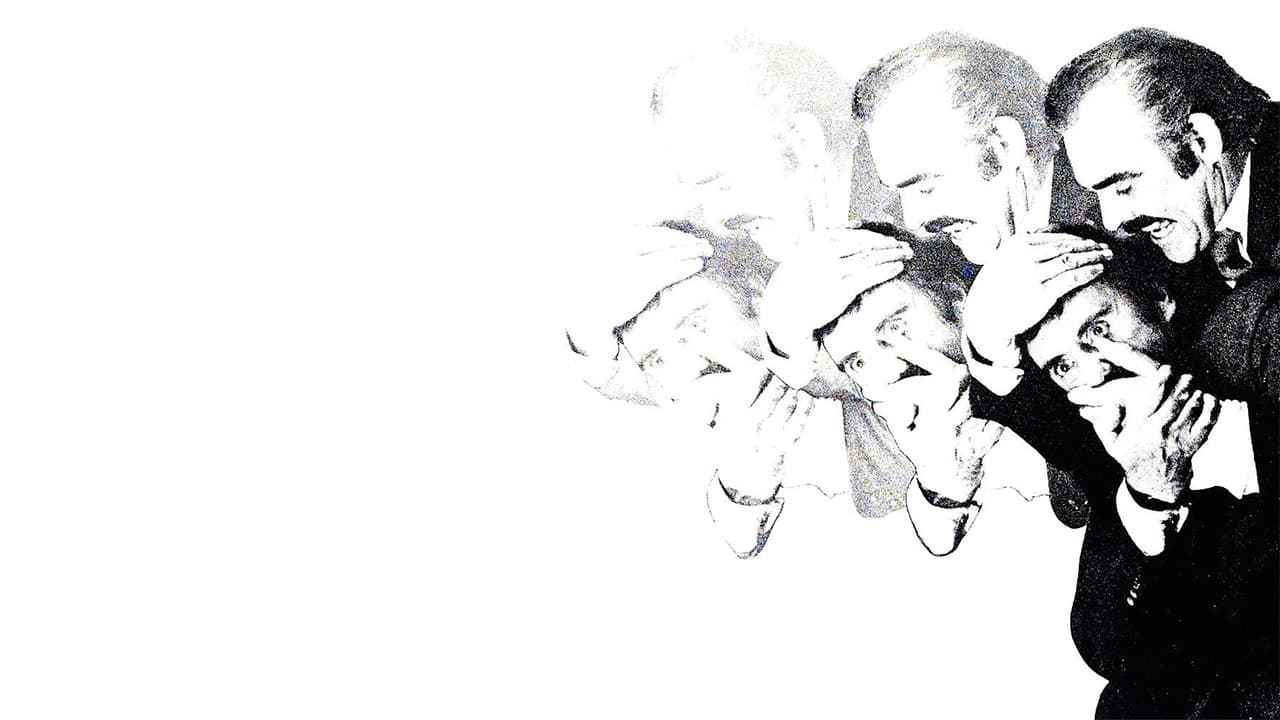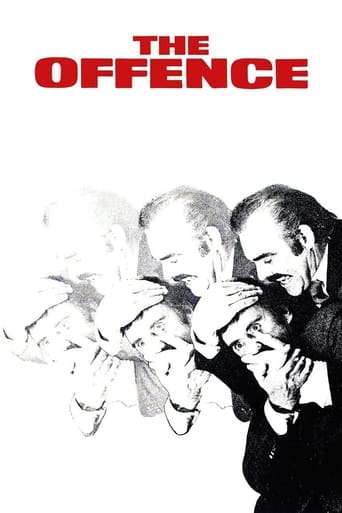Platicsco
Good story, Not enough for a whole film
Comwayon
A Disappointing Continuation
Stoutor
It's not great by any means, but it's a pretty good movie that didn't leave me filled with regret for investing time in it.
filippaberry84
I think this is a new genre that they're all sort of working their way through it and haven't got all the kinks worked out yet but it's a genre that works for me.
tomgillespie2002
Sean Connery is more a superstar than an actor. Although his talents have been recognised by the Academy (for his rather unconvincing turn as an Irish cop in The Untouchables (1987)) and remembered for his role as the first James Bond, he is high up on his own pedestal, a gift for voice actors and one of the handsomest faces ever to have graced the screen. But anyone in doubt of his ability as a proper thespian need look no further than his grim, tormented portrayal of a cop who has seen one too many dead bodies in Sidney Lumet's The Offence, a huge flop at the box office and a film now faded into memory, ripe for a re-discovery.Playing with time Rashomon (1950)-style, the film begins in slow motion, where an unknown disturbance at a police station has a few officers panicked. It is revealed to be Detective Sergeant Johnson (Connery) standing over the bloodied body of suspect Kenneth Baxter (Ian Bannen), with fellow police officers scattered on the floor. It then goes back, and we are in a grey, miserable city gripped in panic as a child-killing paedophile roams free. The latest disappearance of a young girl has Johnson riled, and officers cruising the street pick up Baxter, who is wandering alone in the night covered in mud. The young girl is found raped but alive by Johnson himself, who insists on spending some time alone with the suspect.Based on John Hopkins' stage play This Story of Yours, Connery fought tooth-and-nail to adapt it for the big screen, eventually reprising his role as Bond in Diamond Are Forever (1971) in return for the green-light. Although the film consists of long, talky scenes, Lumet uses stylish editing in order to avoid being stagy and to delve further into his anti-hero's head. His reputation as a no- nonsense director betrays him here, as scenes of gruesome murders, body parts, and a host of other atrocities Johnson has witnessed flash before our eyes. The use of slow motion in the flashback moments also employs a sort of circular filter at the centre of the screen, reflecting Johnson's disconnection from his actions but getting slightly tiresome in the process.There are three long, outstanding scenes. The first is Johnson returning home to his wife (Vivien Merchant) following his interrogation of Baxter, drinking heavily and exploding at the one person who could possibly help him. The second is Johnson's own interrogation with superintendent Cartwright (the ever-excellent Trevor Howard), a man who has witnessed the same level of horror himself, but has learnt to separate his work from his life, something Johnson is unable to do. The third is the extended interrogation of Baxter, where Bannen's creepy turn surely must have been an inspiration for the Joker-Batman verbal showdown in The Dark Knight (2008). It's incredibly bleak stuff, but the raw honesty of the script and performances makes this powerful stuff.www.the-wrath-of-blog.blogspot.com
JasparLamarCrabb
Sean Connery is a British police lieutenant with a major chip on his shoulder. After 20 years of working one sordid crime after another, he's beyond burnt out, he's a serious cup of coffee waiting to spill...and he does...during the interrogation of suspected child rapist Ian Bannen. Sidney Lumet directed this stagy production that gives Connery one of his best and least likely roles; he's a bad good guy. It's a great performance in a highly unheralded film. Connery's anger is palpable and the first-rate supporting cast includes Trevor Howard and Vivien Merchent (as Connery's exhausted wife). The fact that the movie is not particularly cinematic does not dull its power. The script is by John Hopkins, adapting his play "The Story of Yours."
tieman64
Based on a play by John Hopkins, "The Offence" stars Sean Connery as a violent policeman on the hunt of a child molester, played by Ian Bannen.Much of the film simply consists of Connery and Bannen in an interrogation room. It's a battle of the wills, Bannen feigning innocence and Connery insistent that the man is guilty. Of course, everyone thinks Bannen is telling the truth, except Connery, who's been in the gutter so long he knows the mind of a criminal inside out.Not only does Connery know that Bannen is guilty, but he himself identifies with and understands how Bannen thinks. They share the same mind, they've both been to the filthy depths of humanity, both adept at inflicting hurt on each other.The film ends with Connery assaulting Bannen. Unconscious and on the verge of death, Bannen is taken to the very same hospital that his victim, the molested child, was taken. IE- Connery has become a "rapist" just like the man he hunted.Prior to this, flashbacks show Connery being interrogated by his superiors for killing Bannen. This interrogation mirrors Connery's interrogation of Bannen. The tables are turned and it is now Connery who is being questioned and bullied by superiors. IE- power structures hinge on the very dominant/submissive relationship so favoured by Ian Banner's child molester.7.5/10 – Director Sidney Lumet tries to break free of Hopkins' stage play by using flashbacks, slow motion and wonderfully moody exterior shots, but it's not enough. This is filmed theatre, far too stagy and reliant on dialogue.
zofos
After returning to save the James Bond franchise with "Diamonds Are Forever," Sean Connery made a complete left-field choice for his next role. In "The Offence," he plays a stressed-out police officer on the verge of a nervous breakdown who is in a physical and psychological battle with a paedophile suspect he has in custody. Connery's character is also struggling with his own paedophile tendencies. It is an adaptation of John Hopkins play "This Story of Yours." It is essentially a two-hander for the most part with Connery and Ian Bannen (as the paedophile) trying to get the better of one another in the interrogation room of a police station.Even though Sean Connery won his only Oscar for "The Untouchables", for me, this is by far his best performance. He is an absolute powerhouse in this going from shouting, snarling rage to raving and ranting about paedophiles to then sobbing like a child and begging forgiveness.Ian Bannen is, if anything, even better than Connery here. His character veers from confused innocence to leering guilt, from screaming frustration to self-pity and then back to arrogance. It's an amazing performance. Sadly, Ian Bannen was killed in a car crash a few years back. A huge loss to the acting community.While "The Offence" on the surface seems like a very British police procedural drama, it was, surprisingly, directed by the American Sidney Lumet. Like Lumet's best movies ("Twelve Angry Men," "The Hill", "Serpico" and "Dog Day Afternoon") this film features a character in an extremely pressurized situation. It's brave film-making at its darkest. Hollywood certainly took notice as Lumet was chosen to direct a young Al Pacino in two of his breakthrough movies "Serpico" in 1973 and "Dog Day Afternoon" in 1975 after this.This is the kind of film that would not only never be made today, to even suggest it as an idea for a film would probably be the end of your career. So, if you're tired of CGI monsters and explosions and you want to experience raw acting at its finest, get a copy of this film. It is uncomfortable viewing due to its disturbing subject matter, but you won't see better acting anywhere. Highly recommended.

